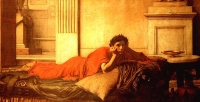Emotion
From The Art and Popular Culture Encyclopedia
(Difference between revisions)
| Revision as of 22:04, 6 July 2009 Jahsonic (Talk | contribs) ← Previous diff |
Revision as of 16:02, 10 July 2009 Jahsonic (Talk | contribs) Next diff → |
||
| Line 1: | Line 1: | ||
| + | [[Image:Characters Caricaturas by William Hogarth.jpg|thumb|200px|''[[Characters Caricaturas]]'' ([[1743]]) by [[William Hogarth]]]] | ||
| [[Image:The Remorse of Nero by Waterhouse.jpg|thumb|200px|''The Remorse of Nero'' ([[1878]]) by [[John William Waterhouse]]]] | [[Image:The Remorse of Nero by Waterhouse.jpg|thumb|200px|''The Remorse of Nero'' ([[1878]]) by [[John William Waterhouse]]]] | ||
| [[Image:Jean-Baptiste Greuze - Ariadne 2.jpg|thumb|200px|''[[Ariadne]]'' ([[1804]]) by [[Jean-Baptiste Greuze]]]] | [[Image:Jean-Baptiste Greuze - Ariadne 2.jpg|thumb|200px|''[[Ariadne]]'' ([[1804]]) by [[Jean-Baptiste Greuze]]]] | ||
Revision as of 16:02, 10 July 2009
|
Related e |
|
Featured: |
Emotion, in its most general definition, is an intense mental state that arises automatically in the nervous system rather than through conscious effort, and evokes either a positive or negative psychological response. An emotion is similar to a feeling.
Noun
- A person's internal state of being, normally based in or tied to their internal (physical) and external (social) sensory feelings.
- The pre-programmed response of a person or animal to an emotionally competent stimulus which gives rise to feelings. The pre-programming may be instinctual or learned.
See also
Unless indicated otherwise, the text in this article is either based on Wikipedia article "Emotion" or another language Wikipedia page thereof used under the terms of the GNU Free Documentation License; or on research by Jahsonic and friends. See Art and Popular Culture's copyright notice.



